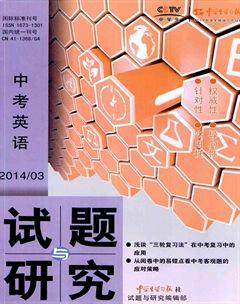中考英语反意疑问句考点解析
周建荣
一、对一般反意疑问句的考查
1.(2013年温州卷)—Its Fathers Day,
?
—Yes. Lets buy a gift for Dad.
A. isnt itB. doesnt it
C. isnt heD. doesnt he
解析:该题陈述部分是肯定形式,简短问句部分须用否定形式,故答案为A。如:
Tom works very hard, doesnt he? 汤姆学习非常用功,不是吗?
2.(2011年枣庄卷)He didnt go there yesterday, he?
A. didB. does
C. didntD. doesnt
解析:该题陈述部分是否定形式,简短问句部分须用肯定形式,故答案为A。如:
They cant speak English, can they? 他们不会说英语,是吗?
3.(2013年营口卷)—Hi, Sam. Your mothers busy these days, ?
—Yes. But she says shell be free soon.
A. has sheB. is she
C. hasnt sheD. isnt she
解析:简短问句部分必须和陈述部分保持时态、人称和数上的一致。该题陈述部分Your mothers 是Your mother is 的缩写形式,故答案为D。如:
Hes gone to library, hasnt he? 他去了图书馆,不是吗?
注意:陈述部分的主语不论属于何种词类,简短问句部分的主语一定要用人称代词;反意疑问句中助动词的否定式要缩写。如:
这是一本有趣的故事书,不是吗?
误:This is an interesting book, is not this?
正:This is an interesting book, isnt it?
二、对特殊反意疑问句的考查
1.(2013年恩施卷)Mr. Zhang hardly said a word because he was angry yesterday,
?
A. didnt heB. did he
C. doesnt he
解析:陈述部分含有hardly, few, little, never, seldom, no, nobody, nothing等否定意义的词时,简略问句要用肯定形式。该题陈述句部分中的hardly意为 “几乎不”,是否定副词,故答案为B。如:
Few people have come to this small island, have they?没有什么人来到这个小岛,是吗?
Jack has nothing to do today, has he?杰克今天没事可做,是吗?
2.(2013年黄石卷)I dont think the newlydirected film by Zhaowei is as interesting as people say, ?
A. do youB. isnt it
C. is itD. dont you
解析:该题陈述部分的I dont think是否定转移形式,这种句式的反意疑问句附加部分的人称和时态要与从句中的时态和人称一致,而且用肯定形式。故答案为C。如:
I dont think Ken did such a stupid thing, did he? 我认为Ken 不会做这种傻事,是吗?
3.(2013年泸州卷)Tell me the way to the cinema,you?
A. willB. need
C. shallD. may
解析:该题为祈使句开头,反意疑问句的附加部分用will you,故答案为A。如:
Dont play in the street, will you? 不要在街上玩耍,好吗?
4.(2012年随州卷)Lets visit the National Museum this weekend, ?
A. will youB. wont we
C. dont weD. shall we
解析:该题是以Lets开头的祈使句,附加问句须用shall we,故答案为D。注意:以Let us开头的祈使句,附加问句则用will you。如:
Let us do it by ourselves, will you?让我们自己做这件事,好吗?
5.(2013年十堰卷)Theres little important news in the newspaper today, ?
A. isnt thereB. is there
C. is itD. are there
解析:该题陈述部分为there be结构,附加问句的主语用there代替,句中又含有little否定副词,故答案为B。如:
There arent any trees in the distance, are there? 远处没有树,是吗?
6.(2011年杭州卷)John had a short walk after lunch, ?
A. did heB. didnt he
C. had heD. hadnt he
解析:该题陈述部分中的had a short walk意为“散步”,had是实意动词,附加问句要用助动词did,故答案为B。注意:当陈述部分动词为have(has, had)时,有下列几种情况:
1)表示“有”之意,附加问句部分谓语可用have或用助动词do。如:
He has a brother, hasnt(或doesnt)he? 他有个弟弟,不是吗?
2)表示“吃、喝、玩、度过”等时,附加问句部分谓语用助动词do(does, did)。如:
She has breakfast at 7:00, doesnt she? 她七点吃早饭,不是吗?
3)have to 表示“不得不、必须”时,附加问句部分谓语用助动词do。如:
We had to read the first lesson, didnt we? 我们须朗读第一课,不是吗?
4)had better有“最好”之意,当其用在陈述部分时,附加问句部分谓语动词应用had。如:
You had better not talk in class, had you? 你在课堂上最好不要讲话,好吗?
三、对反意疑问句答语的考查
(2013年宜宾卷)—Sam didnt go to school yesterday, did he?
—. He was ill yesterday.
A. Yes, he didB. No, he did
C. No, he didntD. Yes, he didnt
解析:英语反意疑问句的回答和汉语反意疑问句的回答不同,如果是肯定回答用“Yes+肯定结构”;否定回答则用“No+否定结构”,绝不可用“No+肯定结构”或“Yes+否定结构”这类汉语式的回答。该题句意为:“Sam昨天没有去上学,是吗?”“是的,他没去。昨天他生病了。”故答案为C。如:
—This news isnt true, is it? 这消息不是真的,是吗?
—Yes, it is.不,它是真的。
自我检测
从每题所给A、B、C、D四个选项中选出可以填入空白处的最佳答案。
1. The government is asked to improve school bus safety, ?
A. didnt itB. hasnt it
C. isnt itD. doesnt it
2.Your brother doesnt enjoy skiing,he?
A. doB. does
C. dontD. doesnt
3. This is a great party, ?
A. is itB. is not it
C. isnt thisD. isnt it
4.—Jim had nothing for breakfast this
morning, ?
—. He got up too late.
A. had she; YesB. hadnt he; Yes
C. did he; NoD. didnt; No
5.Alice had a wonderful time yesterday,
?
A. hadnt sheB. wasnt she
C. didnt sheD. wouldnt she
6.She has never been to the city,she?
A. doesntB. hasnt
C. hasD. does
7.Email is very popular today. People
seldom write letters now, ?
A. did theyB. do they
C. didnt theyD. dont they
8.She can hardly write her own name,
?
A. can sheB. cant she
C. need sheD. neednt she
9.There is little milk in the fridge,
?
A. is thereB. isnt there
C. isnt itD. is it
10.Few of them hurt themselves in the
accident last night, ?
A. did theyB. didnt they
C. dont theyD. do they
11.I dont think he will come, ?
A. do youB. will he
C. wont heD. dont you
12. —He hasnt watched the movie “So Young”, has he?
—. He told me its very moving and interesting, hed like to watch it again.
A. Yes, he hasB. Yes, he hasnt
C. No, he hasntD. No, he has
13.Youve just finished your listening exam. Please get yourself ready for the next part,
?
A. shall weB. will you
C. do youD. are you
14.We forgot to bring our tickets, but please let us enter, ?
A. do youB. shall we
C. will youD. dont we
15.Lets take a walk after lunch, ?
A. will weB. dont we
C. do weD. shall we
16.—Shes gone abroad, ?
—No. She is still teaching us English at our school now.
A. is sheB. isnt she
C. has sheD. hasnt she
17.—He didnt go to the concert yesterday, did he?
—. He was busy studying for the tests all day.
A. No, he didntB. Yes, he did
C. No, he didD. Yes, he didnt
18.You have to get up at six every morning, ?
A. dont youB. have you
C. havent youD. do you
19.They had a meeting in the school yesterday,they?
A. hadntB. had
C. didntD. did
20.—You havent been to the West Lake, have you?
—. But I will go there with my parents this summer vacation.
A. No, I haventB. No, I didnt
C. Yes, I haveD. yes, I did
参考答案
1~5 CBDCC6~10 CBAAA
11~15 BABCD 16~20 DAACA

